Genetic mapping of resistance to Meloidogyne arenaria in arachis stenosperma: a new source of nematode resistance for peanut.
Genetic mapping of resistance to Meloidogyne arenaria in arachis stenosperma: a new source of nematode resistance for peanut.
Autoria: LEAL-BERTIOLI, S. C. M.; MORETZSOHN, M. C.; ROBERTS, P. A.; BALLEN-TABORDA, C.; BORBA, T. C. O.; VALDISSER, P. A.; VIANELLO, R. P.; ARAUJO, A. C. G.; GUIMARAES, P. M.; BERTIOLI, D. J.
Resumo: Root-knot nematodes (RKN; Meloidogyne sp.) are a major threat to crops in tropical and subtropical regions worldwide. The use of resistant crop varieties is the preferred method of control because nematicides are expensive, and hazardous to humans and the environment. Peanut (Arachis hypogaea) is infected by four species of RKN, the most damaging being M. arenaria, and commercial cultivars rely on a single source of resistance. In this study, we genetically characterize RKN resistance of the wild Arachis species A. stenosperma using a population of 93 recombinant inbred lines developed from a cross between A. duranensis and A. stenosperma. Four quantitative trait loci (QTL) located on linkage groups 02, 04, and 09 strongly influenced nematode root galling and egg production. Drought-related, domestication and agronomically relevant traits were also evaluated, revealing several QTL. Using the newly available Arachis genome sequence, easy-to-use KASP (kompetitive allele specific PCR) markers linked to the newly identified RKN resistance loci were developed and validated in a tetraploid context. Therefore, we consider that A. stenosperma has high potential as a new source of RKN resistance in peanut breeding programs.
Ano de publicação: 2015
Tipo de publicação: Artigo de periódico
Observações
1 - Por padrão são exibidas publicações dos últimos 20 anos. Para encontrar publicações mais antigas, configure o filtro ano de publicação, colocando o ano a partir do qual você deseja encontrar publicações. O filtro está na coluna da esquerda na busca acima.
2 - Para ler algumas publicações da Embrapa (apenas as que estão em formato ePub), é necessário ter, no celular ou computador, um desses softwares gratuitos. Sistemas Android: Google Play Livros; IOS: iBooks; Windows e Linux: software Calibre.
Acesse outras publicações
Acesse a Base de Dados da Pesquisa Agropecuária (BDPA) para consultar o acervo completo das bibliotecas da Embrapa.

